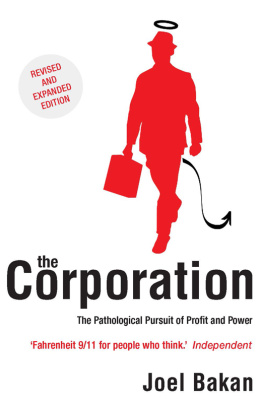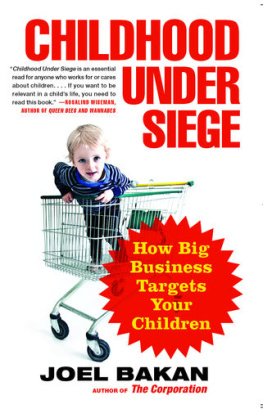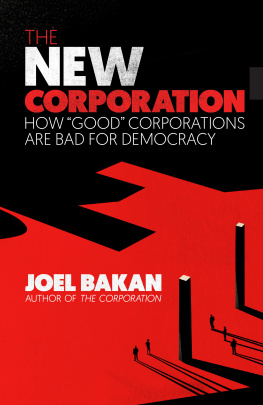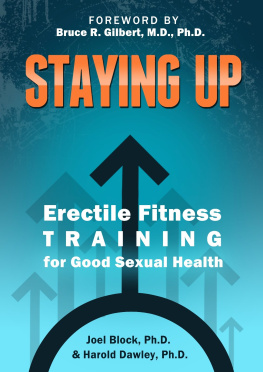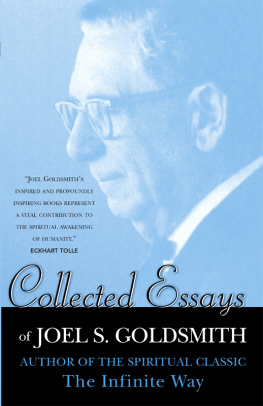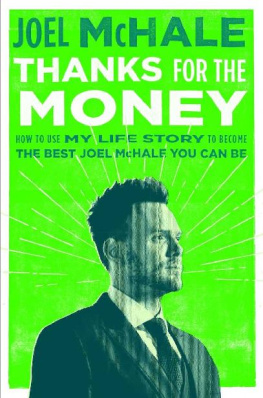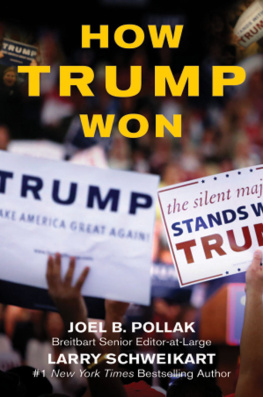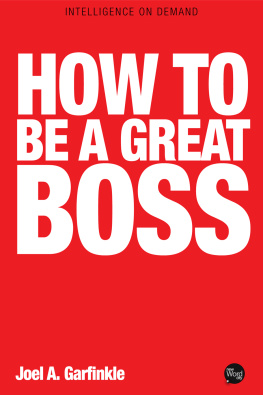Joel Bakan - The Corporation
Here you can read online Joel Bakan - The Corporation full text of the book (entire story) in english for free. Download pdf and epub, get meaning, cover and reviews about this ebook. publisher: Constable & Robinson, genre: Business. Description of the work, (preface) as well as reviews are available. Best literature library LitArk.com created for fans of good reading and offers a wide selection of genres:
Romance novel
Science fiction
Adventure
Detective
Science
History
Home and family
Prose
Art
Politics
Computer
Non-fiction
Religion
Business
Children
Humor
Choose a favorite category and find really read worthwhile books. Enjoy immersion in the world of imagination, feel the emotions of the characters or learn something new for yourself, make an fascinating discovery.
- Book:The Corporation
- Author:
- Publisher:Constable & Robinson
- Genre:
- Rating:3 / 5
- Favourites:Add to favourites
- Your mark:
- 60
- 1
- 2
- 3
- 4
- 5
The Corporation: summary, description and annotation
We offer to read an annotation, description, summary or preface (depends on what the author of the book "The Corporation" wrote himself). If you haven't found the necessary information about the book — write in the comments, we will try to find it.
Joel Bakan: author's other books
Who wrote The Corporation? Find out the surname, the name of the author of the book and a list of all author's works by series.
The Corporation — read online for free the complete book (whole text) full work
Below is the text of the book, divided by pages. System saving the place of the last page read, allows you to conveniently read the book "The Corporation" online for free, without having to search again every time where you left off. Put a bookmark, and you can go to the page where you finished reading at any time.
Font size:
Interval:
Bookmark:
The world is going to hell in a handbasket. What can we do about it? We sayread one book, see one movie... Call your friends, your enemies and your family. Get your hands on a copy of this movie and a copy of this book.
Counterpunch
Bakans analysis is strong on pinpointing problems with current business.
Harvard Business Review
All senior business executives should find the time to read this well-researched and well-written book... The Corporation will force you to reflect on what really matters, both in ones life and in ones company.
The Globe and Mail
His prose is soothing, free of scholarly clottedness and leftist stridency. The reader is impressedthrilled evento watch him coolly denude the corporate person until it stands naked and vulnerable...
Vancouver Sun
THE
CORPORATION

THE PATHOCLOGICAL PURSUIT OF PROFIT AND POWER

Joel Bakan
CONSTABLE LONDON
Constable & Robinson Ltd
5556 Russell Square
London WC1B 4HP
www.constablerobinson.com
First published in the USA by Free Press,
a division of Simon & Schuster Inc, 2004
Published in the UK by Constable,
an imprint of Constable & Robinson Ltd, 2004
This edition published by Constable,
an imprint of Constable & Robinson Ltd, 2005
Copyright by Joel Bakan 2004, 2005
The right of Joel Bakan to be identified as the author of this work has been asserted by him in accordance with the Copyright, Designs and Patents Act 1988
All rights reserved. This book is sold subject to the condition that it shall not, by way of trade or otherwise, be lent, re-sold, hired out or otherwise circulated in any form of binding or cover other than that in which it is published and without a similar condition including this condition being imposed on the subsequent purchaser.
A copy of the British Library Cataloguing in
Publication data is available from the British Library
ISBN 1-84529-174-3
eISBN 978-1-78033-741-8
Printed and bound in the EU
1 3 5 7 9 10 8 6 4 2
Cover design, joeroberts.co.uk; Cover image, Big Picture Media Corporation
For Marlee
As images of disgraced and handcuffed corporate executives parade across our television screens, pundits, politicians, and business leaders are quick to assure us that greedy and corrupt individuals, not the system as a whole, are to blame for Wall Streets woes. Have we just been talking about some bad apples? Sam Donaldson recently asked former New York Stock Exchange chief Richard Grasso on ABCs This Week, or is there something in the system that is broken? Well, Sam, Grasso explained, weve had some massive failures, and weve got to root out the bad people, the bad practices; and certainly, whether the number is one or fifteen, thats in comparison to more than ten thousand publicly traded corporationsbut one, Sam, just one WorldCom or one Enron, is one too many. Despite such assurances, citizens todayand many business leaders tooare concerned that the faults within the corporate system run much deeper than a few tremors on Wall Street would indicate. These larger concerns are the focus of this book.
A key premise is that the corporation is an institutiona unique structure and set of imperatives that direct the actions of people within it. It is also a legal institution, one whose existence and capacity to operate depend upon the law. The corporations legally defined mandate is to pursue, relentlessly and without exception, its own self-interest, )? These are the central questions that inform the book. By revealing the institutional imperatives common to all corporations and their implications for society, I hope to provide a crucial and missing link in peoples attempts to understand and do something about some of the most pressing issues of our time.
Peter Drucker, perhaps the worlds leading management thinker, was one of the first to analyze the corporation as an institution in his groundbreaking 1946 work, Concept of the Corporation. It was Drucker who thought it significant that all corporations have the same institutional order and purpose. For most of us, however, the daily details of corporate life tend to obscure the bigger picture. Like Pfizer CEO Hank McKinnell, we have great difficulty thinking of corporations as an institution. We understand them, instead, mainly in terms of how they differ from one anothertransnational versus local, high-tech versus smokestack, progressive versus traditional, cool versus stodgy, blue-chip versus risky, brand name versus no-name, good versus badand miss the fact that all corporations, at least all publicly traded ones, share a common institutional structure; that it makes sense to talk about the corporation, as well as corporations. As veteran Harvard Business School scholar Joe Badaracco remarked when asked the simple question What is a corporation?: Its funny that Ive taught in a business school for as long as I have without ever having been asked so pointedly to say what I think a corporation is.

Over the last 150 years the corporation has risen from relative obscurity to become the worlds dominant economic institution. Today, corporations govern our lives. They determine what we eat, what we watch, what we wear, where we work, and what we do. We are inescapably surrounded by their culture, iconography, and ideology. And, like the church and the monarchy in other times, they posture as infallible and omnipotent, glorifying themselves in imposing buildings and elaborate displays. Increasingly, corporations dictate the decisions of their supposed overseers in government and control domains of society once firmly embedded within the public sphere. The corporations dramatic rise to dominance is one of the remarkable events of modern history, not least because of the institutions inauspicious beginnings.
Long before Enrons scandalous collapse, the corporation, a fledgling institution, was engulfed in corruption and fraud. Throughout the Though the commissioners were appalled, they likely were not surprised.
Businessmen and politicians had been suspicious of the corporation from the time it first emerged in the late sixteenth century. Unlike the prevailing partnership form, in which relatively small groups of men, bonded together by personal loyalties and mutual trust, pooled their resources to set up businesses they ran as well as owned, the corporation separated ownership from managementone group of people, directors and managers, ran the firm, while another group, shareholders, owned it. That unique design was believed by many to be a recipe for corruption and scandal. Adam Smith warned in The Wealth of Nations that because managers could not be trusted to steward other peoples money, negligence and profusion would inevitably result when businesses organized as corporations. Indeed, by the time he wrote those words in 1776, the corporation had been banned in England for more than fifty years. In 1720, the English Parliament, fed up with the epidemic of corporate high jinks plaguing Exchange Alley, had outlawed the corporation (though with some exceptions). It was the notorious collapse of the South Sea Company that had prompted it to act.
Next pageFont size:
Interval:
Bookmark:
Similar books «The Corporation»
Look at similar books to The Corporation. We have selected literature similar in name and meaning in the hope of providing readers with more options to find new, interesting, not yet read works.
Discussion, reviews of the book The Corporation and just readers' own opinions. Leave your comments, write what you think about the work, its meaning or the main characters. Specify what exactly you liked and what you didn't like, and why you think so.

